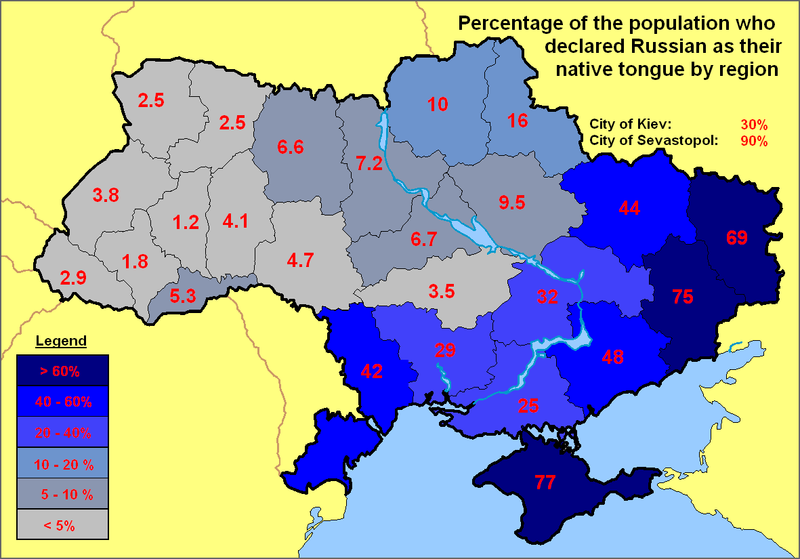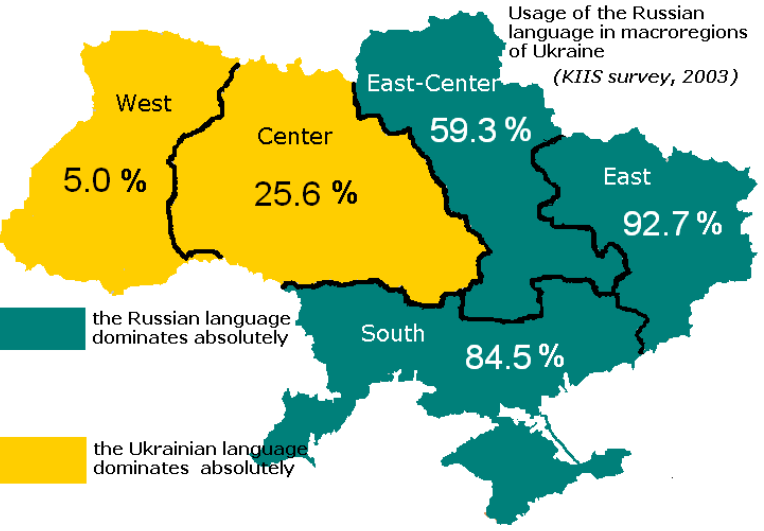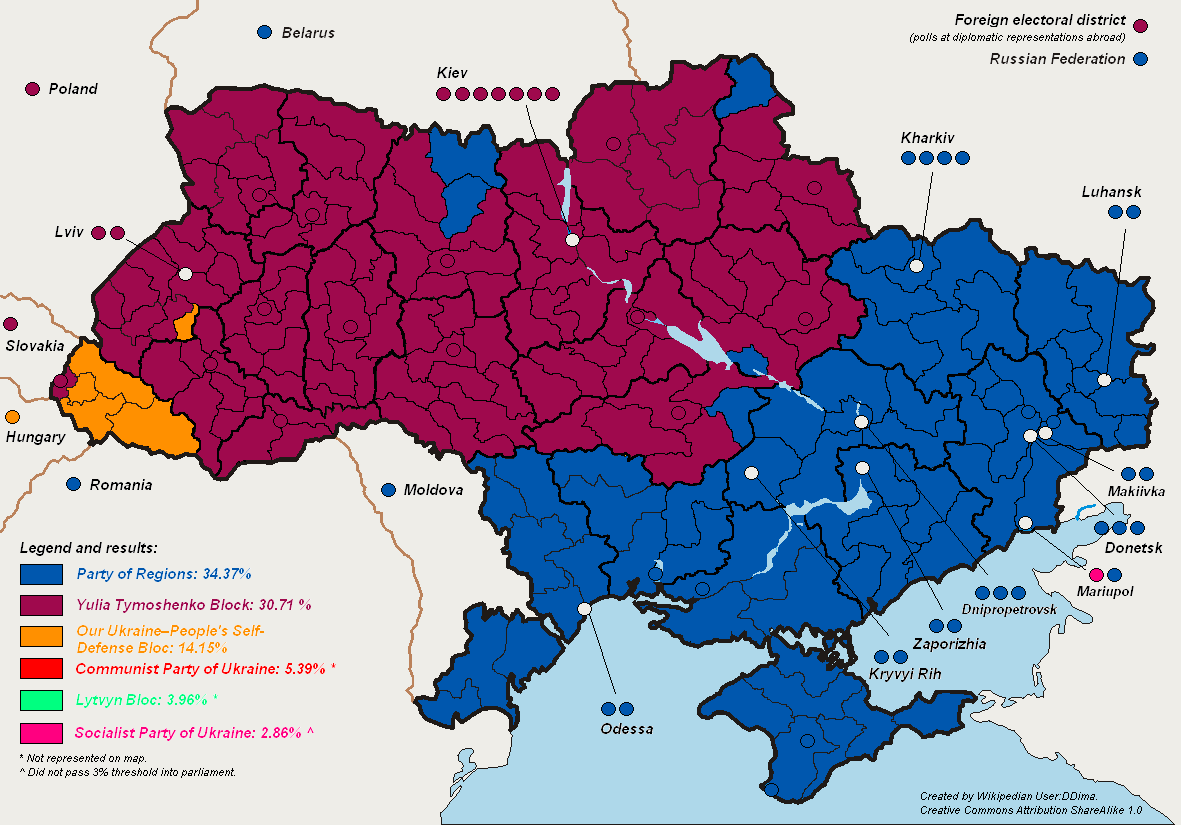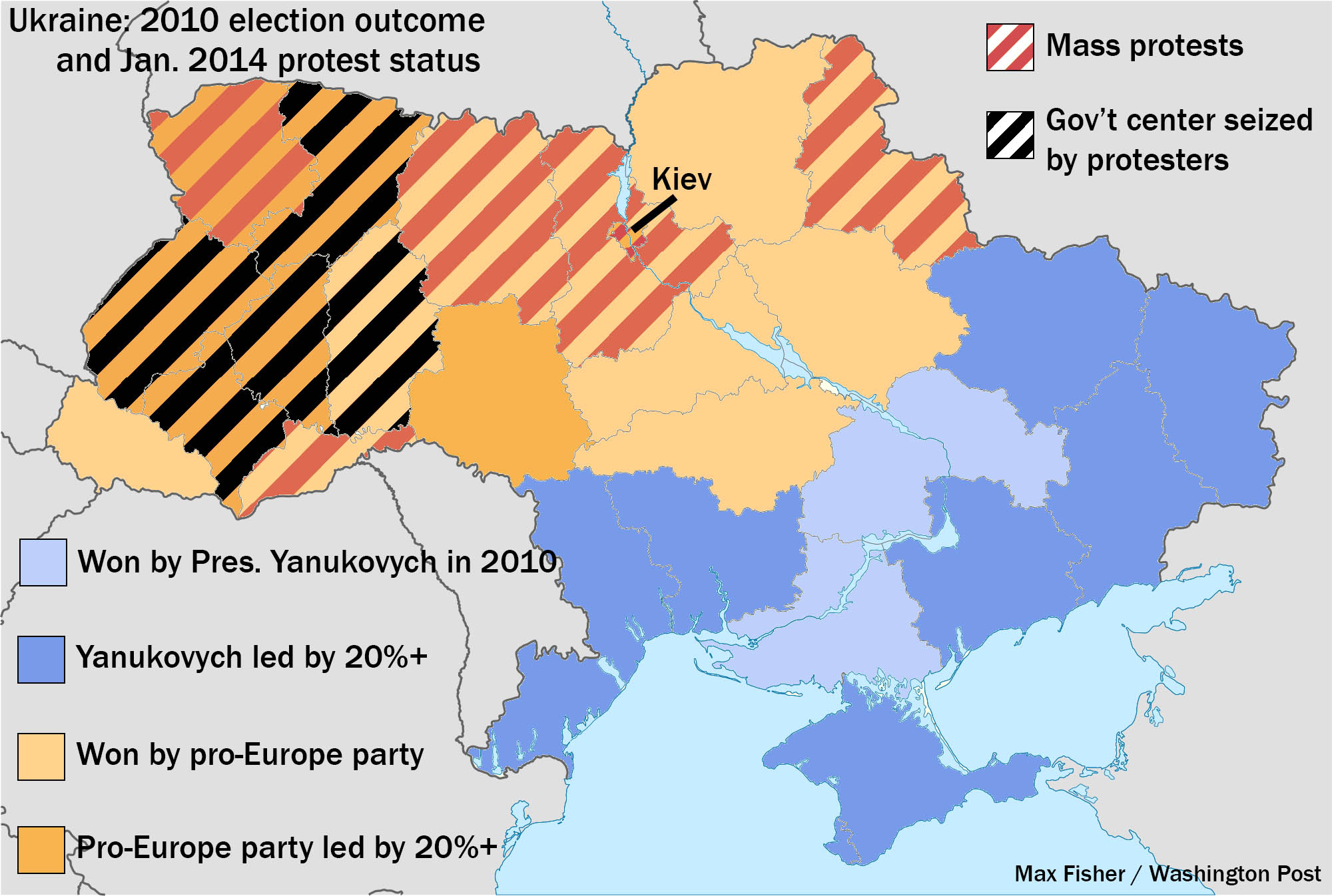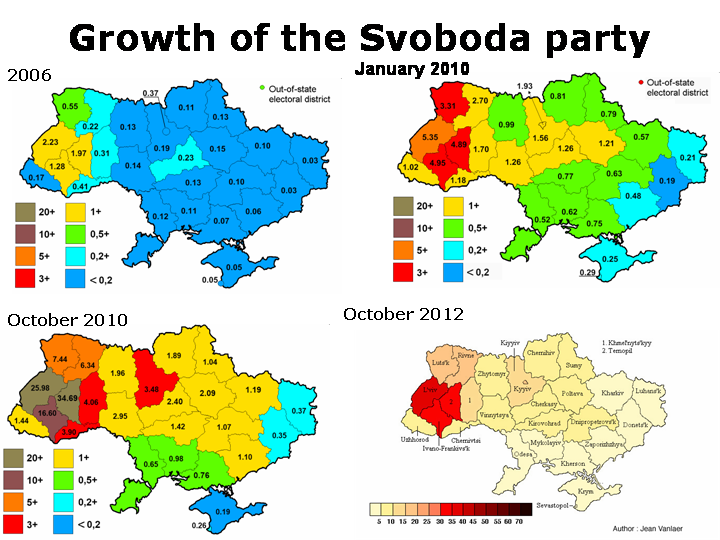Dear Readers, the following post has been published on the 3rd of March 2014. Due to the recent historical events we are reposting it, conscient of the prescience of the meanwhile passed author, Pater Tenebrarum. Michael, Editor Russian Troops in the Crimea John Kerry is appropriately aghast at the “incredible act of aggression” by Russia in the Ukraine: “You just don’t in the 21st century behave in 19th century fashion by invading another country on completely trumped up pre-text,” Kerry told the CBS program “Face the Nation.” This new-found respect for the sovereignty of foreign nations represents a laudable 180 degree change in US foreign policy. You just don’t do that in the 21st century! Like e.g. invading Iraq by making up tall stories about “weapons of
Topics:
Pater Tenebrarum considers the following as important: 6b.) Acting Man, 6b) Austrian Economics, Breaking News, Featured, newsletter, On Politics
This could be interesting, too:
Nachrichten Ticker - www.finanzen.ch writes Die Performance der Kryptowährungen in KW 9: Das hat sich bei Bitcoin, Ether & Co. getan
Nachrichten Ticker - www.finanzen.ch writes Wer verbirgt sich hinter der Ethereum-Technologie?
Martin Hartmann writes Eine Analyse nach den Lehren von Milton Friedman
Marc Chandler writes March 2025 Monthly
Dear Readers,
the following post has been published on the 3rd of March 2014. Due to the recent historical events we are reposting it, conscient of the prescience of the meanwhile passed author, Pater Tenebrarum.
Michael, Editor
Russian Troops in the Crimea
John Kerry is appropriately aghast at the “incredible act of aggression” by Russia in the Ukraine:
“You just don’t in the 21st century behave in 19th century fashion by invading another country on completely trumped up pre-text,” Kerry told the CBS program “Face the Nation.”
This new-found respect for the sovereignty of foreign nations represents a laudable 180 degree change in US foreign policy. You just don’t do that in the 21st century! Like e.g. invading Iraq by making up tall stories about “weapons of mass destruction” hidden there. It’s just not done. As an aside to this: in February, the civil war currently raging in Iraq has cost yet another 1,705 lives, with 2,045 wounded. The death toll is a considerable increase from January’s 1,284 dead and 2,088 wounded. Perhaps you weren’t aware there is a civil war raging in Iraq? If so, that is no surprise. The Western media have fallen almost completely silent on the topic. Yet, this is what the famous ‘mission’ has actually ‘accomplished’.
As Jason Ditz reports regarding the recent escalation in the Crimea:
“While US politicians have also ratcheted up the rhetoric, US officials concede that Russia’s troops in Crimea are setting up defensive positions and are in a “self-defense posture only.”
Reports from Crimea’s government say they’ve got Russian troops helping them protect government buildings in anticipation of the referendum, and with a sense that will easily back secession and re-accession into the Russian federation, it seems that Russia doesn’t need to “invade” at all, but simply needs to keep the interim government at bay until Crimean voters affirm the switch.”
(emphasis added)
But we actually can’t have a democratic referendum, can we? Especially one the outcome of which is very likely going to be one that doesn’t conform to ‘our’ (the Western powers) wishes. So let’s get this straight: removing a democratically elected government by violence is perfectly fine with our politicians. Please note in this context that Yanukovich, for all his faults, was actually offering one conciliatory gesture after another: he offered the opposition to join the government, he extended an amnesty to all imprisoned protesters, he twice offered a truce and agreed to early presidential elections. It is not entirely clear which side broke the truce – if press reports are to be believed, the protesters sure had a hand in it (many of the most violent ones are supporters of the fascist ‘Svoboda’ party). Even CNN admitted as much, and CNN is usually well known for tailoring its reporting to the wishes of the powers-that-be (CNN’s habit of faking reports is by now legendary). So, a violent revolution is fine, but a referendum over whether the Crimea wants to remain with the Ukraine is considered anathema. By the way, we are certainly not arguing that Yanukovich is anything but a major sleazeball; there is evidently an endless supply of those in Ukrainian politics. There is also little doubt that Yanukovich in the end gave the green light to his security forces to use live ammunition. We certainly don’t want to paint Yanukovich as a perfectly innocent party. We are merely pointing out a few facts that seem to be getting short shrift in the mainstream press.
“Territorial Integrity” NonsenseThe main point we want to make is though that it is absurd that everybody insists on keeping the ‘territorial integrity’ of the Ukraine intact, as if it had any special meaning or as if there were any reason to regard it as sacrosanct. The Ukraine as it exists today is largely a creation of Soviet communists, who deliberately added large Russian-dominated territories to the Ukraine precisely because they wanted to keep a lid on nationalist sentiments. In fact, the Ukrainian territory of today is – with the sole exception of a tiny piece of heartland – almost entirely a Russian creation. What the communists didn’t tack on, the Tzars did. Here is a historical map that shows what occurred. Note in this context also that the past 23 years since the implosion of the Soviet Bloc are the longest period of time in which the Ukraine has been independent in more than 300 years. That is of course not meant to imply that it shouldn’t be independent. The importance of maintaining the ‘territorial integrity’ of a territory put together by a bunch of Soviet communists over the past 90 years eludes us however. The tiny orange piece in the middle was the original Ukraine. Later additions to the then Russian province and later Soviet Republic were all the work of Russian tzars and Soviet communists. Not even Kiev was originally part of the Ukraine. And obviously, the Crimea was the most recent addition to its territory, courtesy of Nikita Khrushchev. That makes it a sacrosanct part of the Ukraine how exactly? |
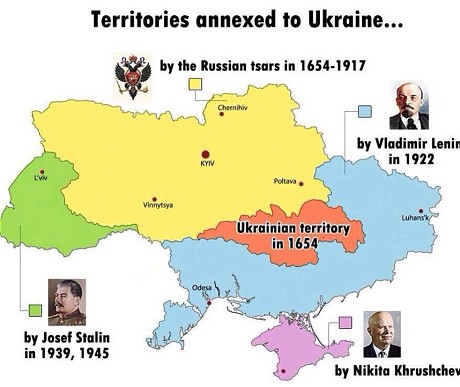 |
When Yugoslavia fell apart, keeping its ‘territorial integrity’ intact was the last thing on the mind of Western powers. They demanded the exact opposite: Serbia was to be dismantled. When Czechs and Slovaks parted ways amicably, the world somehow kept turning as well. The biggie is of course the Soviet empire itself: there was widespread delight at its ‘loss of territorial integrity’. By contrast, when West and East Germany let it be known they wanted to reunify, the allied powers were initially against it. It took a lot of deft maneuvering by the West German government (including paying a big political and economic price by agreeing to the introduction of the euro) to finally convince all the former WW2 allies to give their placet to reunification.
It should be obvious that the demands regarding the Ukraine’s territorial integrity are largely a result of the utterly pointless geopolitical contest between Washington and Moscow. What the citizens of the Ukraine want is way down on the list of priorities. Incidentally, now that Ukrainians have the government Victoria Nuland planned for them, they are already beginning to doubt it.
“Protesters on the square universally tell tales of the wild riches that ordinary parliamentarians gain – one confidently talked of the “millions” a member of parliament can get for voting correctly during a debate. They reckon that the leaders of the opposition-turned government, such as acting President Oleksander Turchinov and Prime Minister Arseny Yatseniuk will enjoy such benefits.”
That is of course the main reason for entering politics in the Ukraine, so the protesters probably have it quite right. On the other hand, Yanukovich and Tymoshenko before him have apparently looted the state’s coffers so thoroughly that the only way to get at fresh moolah in the near future is via the EU/IMF.
Let us get back to the territorial integrity question though. In the meantime, just as we suspected would happen, other Eastern Ukrainian regions have joined the Crimea in reconsidering their status.
“Dozens of people were hurt in clashes on Saturday when pro-Russia activists stormed the regional government’s headquarters in the eastern Ukrainian city of Kharkiv and raised the Russian flag, local media said. The UNIAN news agency said thousands of people had gathered outside the building during a protest against the country’s new leaders who ousted President Viktor Yanukovich a week ago.
The violence signaled that Ukraine’s new leaders could face a challenge in mainly Russian-speaking regions that oppose the largely pro-Western course charted by the newly installed government. The leaders of Crimea, a Black Sea peninsula with an ethnic Russian majority that is home to a Russian naval base, say they have joined forces with Russian servicemen to exert control over key buildings. Russian parliament has approved a proposal by President Vladimir Putin to deploy troops in Ukraine.
Protests against the new authorities also took place on Saturday in other cities, including Odessa, Dnipro and Donetsk, Yanukovich’s home town and power base.
The Russian flag was raised over the regional government building in Donetsk by several thousand pro-Russia activists waving the Russian tricolour and chanting “Russia! Russia!, witnesses said. Donetsk authorities issued an appeal for a referendum to be called on the future status of the region.”
(emphasis added)
| This is precisely what we expected: as soon as the Crimea announced it would hold a referendum on its status, other regions with a predominantly Russian speaking population would follow suit. Again, why wouldn’t they? The new government has just declared their mother tongue ‘lingua non grata‘ again.
And why should some of the Eastern regions not be allowed to secede from the Ukraine? After all, it can be shown unequivocally that the constant eruption of violent conflict is not only the result of popular discontent with the corrupt political and economic elite. It is firmly rooted in an ethnic-linguistic conflict that could be resolved once and for all by a partition. The charts below are making all of this perfectly clear. |
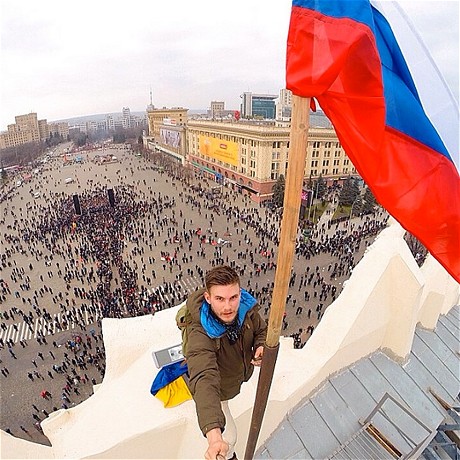 The Russian flag is hoisted in Kharkiv (Photo via AFP / Getty Images) |
An Ethnic and Linguistic Conflict in PicturesFirst let us take a detailed look at the linguistic situation. Ukrainian is spoken mainly in the Western Ukraine, while Russian predominates in the Eastern part of the country. What is interesting is that the percentage of citizens that support making Russian the second official language is quite a bit higher than the percentage naming it as their mother tongue. Obviously, most Ukrainians actually understand and speak Russian. The first three charts show survey results from 2003, which are a bit outdated by now, but nevertheless illustrate the basic situation. Note that there is a historical reason for this East-West split: much of today’s Western Ukraine used to be part of the late medieval Lithuanian Empire, and later the Polish-Lithuanian Commonwealth, which became a Russian protectorate in 1768 and was subsequently partitioned several times. At the time of its largest territorial extent, the regions that are today considered part of the ‘Eastern Ukraine’ were actually Russian territory. A historical map of the Polish-Lithuanian Commonwealth can be seen here). |
|
| Support for making Russian the second official language. It is interesting that the idea has considerable support in several central/Western regions as well, in spite of the fact that most of the inhabitants declare Ukrainian to be their mother tongue | 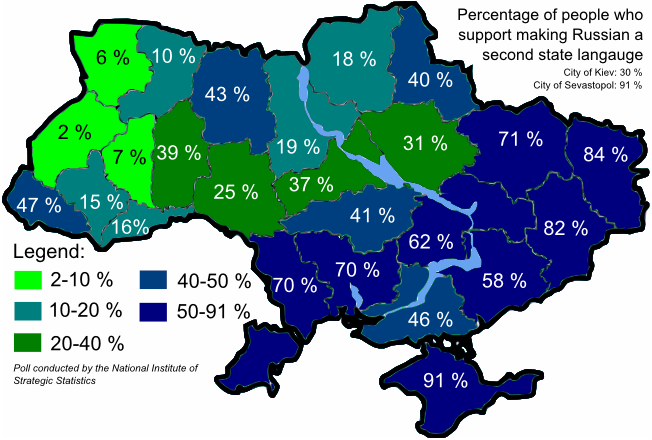 |
| Finally, a 2011 survey by a Kiev based think-tank, showing the regions which have made Russian the second official language after Yanukovich signed a law making it possible to adopt it as a ‘regional’ official language. This was one of the first laws the new government reversed. Looking at the map above, is it any wonder Russian flags are hoisted in cities in Kharkiv, Donetsk and the Crimea?
As to why we feel so certain that the linguistic divide truly reflects the political conflict, nothing is easier to prove. The first map below shows the 2004 election results after the ‘Orange Revolution’ ousted the the first Yanukovich government in favor of the Yushchenko/Tymoshenko government. The election result reflected the linguistic divide to a ‘T’. |
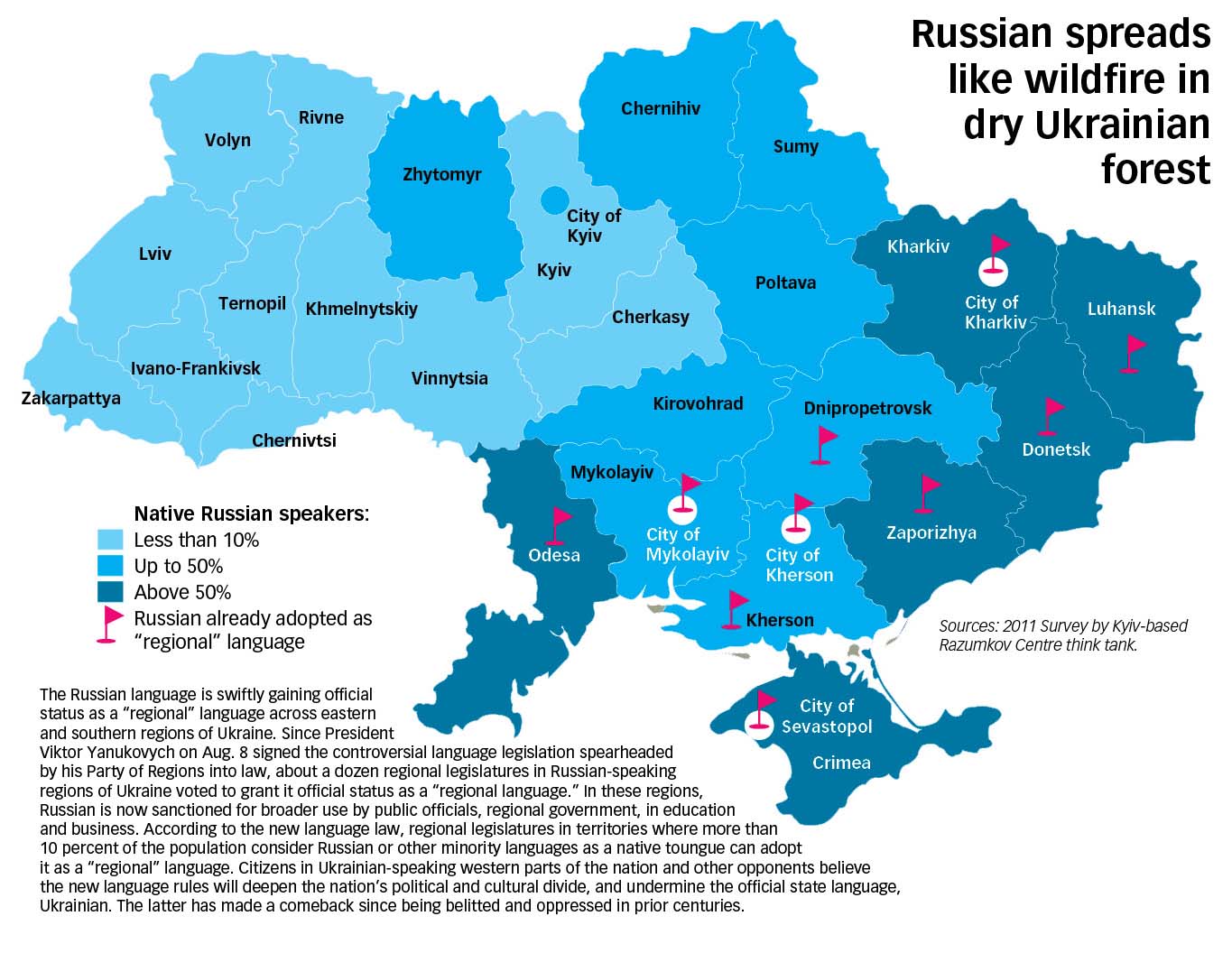 |
| Below that we see the results of the 2010 election, which took place long after Yushchenko had fallen from grace, toppled by his former ally, the ‘gas princess’ Yulia Tymoshenko. Apparently even a number of Western Ukrainians were so fed up with Tymoshenko that a number of them decided to support the no less tainted Yanukovich (Yanukovich has been a force in Ukrainian politics since the demise of the Kuchma regime. Kuchma’s government was largely a Western Ukrainian kleptocracy, but both Yushchenko and Yanukovich actually served in it as prime minsters at some point).
The 2004 election in the Ukraine, which former ‘Orange Revolution’ star Yushkenko won. In 2010, he would not even garner 10% of the vote. The degree of East-West polarization is astonishing. Funny enough, both Yushchenko and Yanukovich once served as prime ministers in the Kuchma government. |
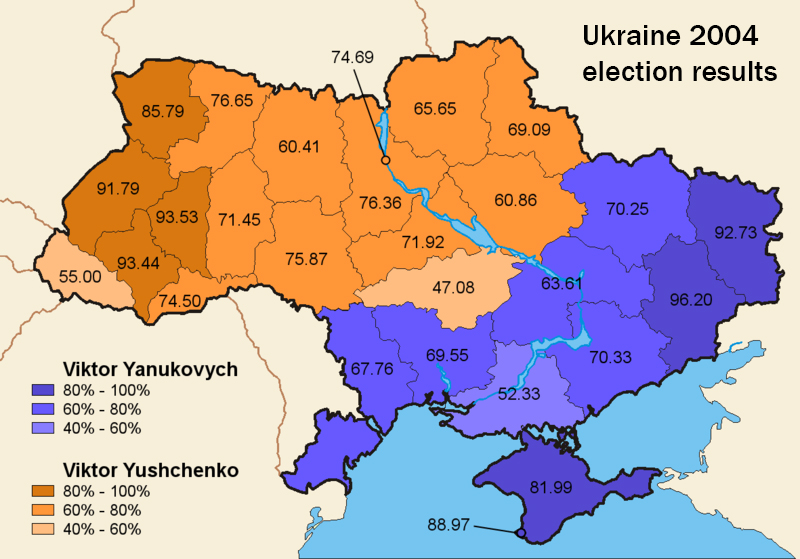 |
| The 2010 run-off election between Yanukovich and Tymoshenko. This map shows which of the regions were ultimately won by one or the other. | 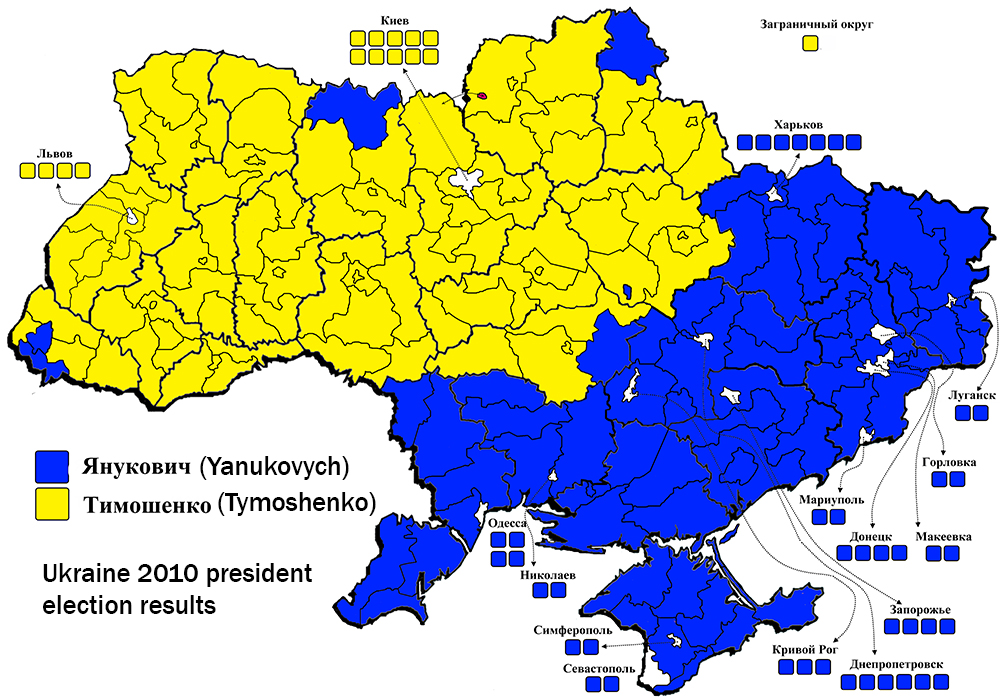 |
| A more detailed map of the same election, which indicates that polarization was slightly less pronounced than in 2004, largely because Tymoshenko was no longer regarded as trustworthy by many of her former supporters after deserting Yushchenko and making deals with Yanukovich – not to mention her involvement in various financial scandals. Nevertheless, the result still strongly reflects the linguistic divide. | 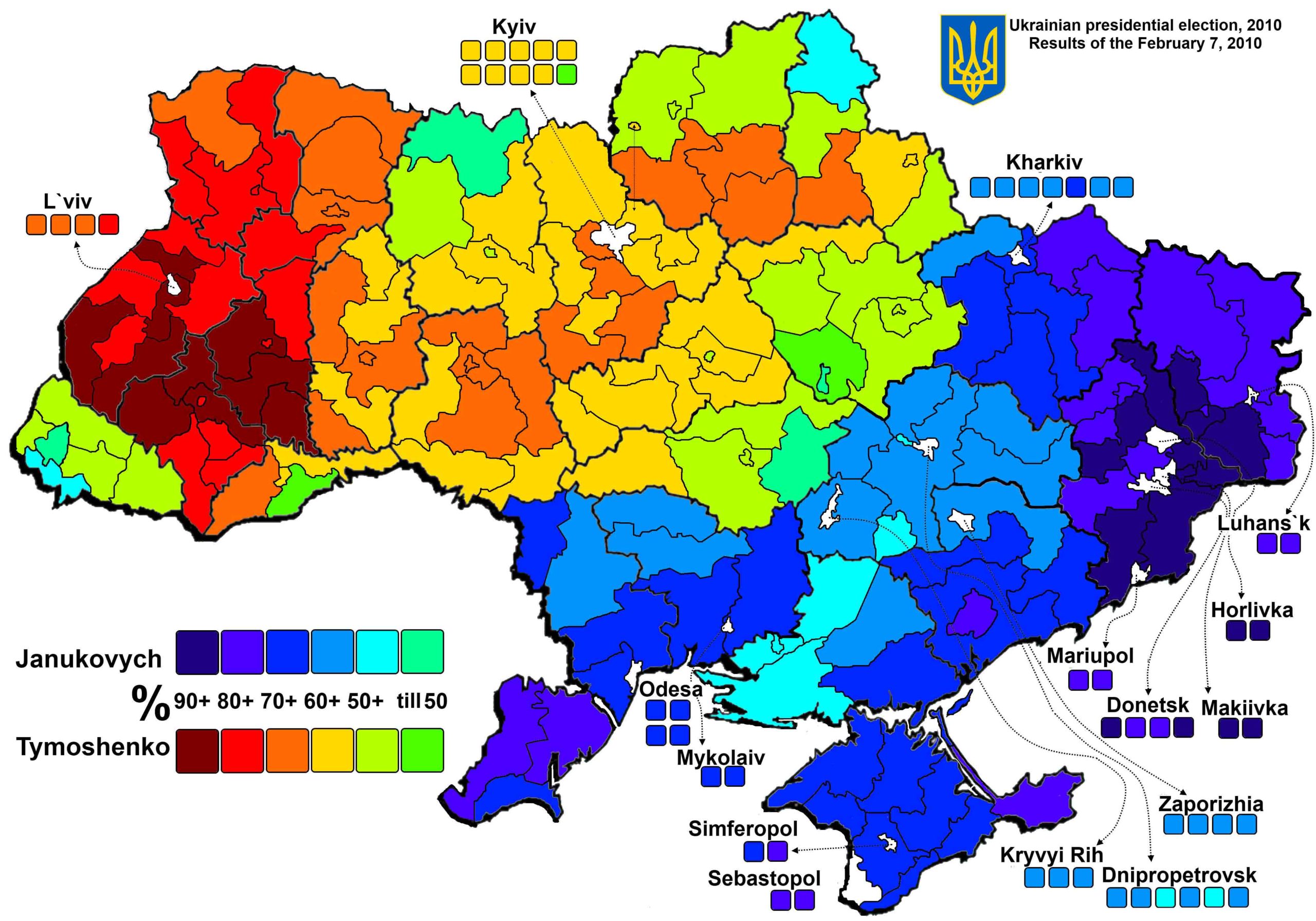 |
| Next is a detailed map of the 2007 parliamentary election (at the time, Tymoshenko still enjoyed more support than in 2010). By and large it reflects exactly the same phenomenon: people simply tended to vote for ‘their’ crook, regardless of how corrupt he or she was held to be: | |
| Next, a map showing where exactly the protests against Yanukovich broke out last year and their status in 2014: | |
| The next map shows the growing electoral success of the fascist ‘Svoboda’ party, formerly called the ‘Social Nationalist Party’. Here is a video of a march organized by one of its leaders, Yuri Michalchyshyn. At the time the party still used the “wolf’s angel” heraldic cross as its symbol. Similarities with the Swastika are entirely coincidental of course.
These worthies have increasingly captured the imagination of Western Ukrainian voters, gaining 38 seats in the 2012 parliament. Compare the regions in which their support was the greatest in 2012 with the the regions where government buildings were forcefully occupied according to the map above. This tells us something about their willingness to employ violence. Will Svoboda’s influence wane now that the opposition has taken over? Perhaps, but we actually doubt it. We suspect for one thing that the party’s alliance with the more moderate ‘Fatherland Party’ of Yatseniuk/Tymoshenko is largely an alliance of convenience. It is doubtful that Svoboda really shares their eagerness for joining the EU – it is largely its virulent anti-Russian stance that informs its lip service on that point. |
The new government will be forced to take many unpopular decisions due to the precarious financial and economic state the Ukraine finds itself in. Svoboda may well decide that it will be to its benefit to oppose these decisions. Hard economic times are typically when radical parties like Svoboda tend to flourish.
Speaking of economic and financial hardship, the Yanukovich government was welcome to subsidized gas deliveries from Russia’s Gazprom. However, Russia has of course no interest in extending the discounted price to the new government – and it can point to the fact that there is still a rather large unpaid bill outstanding:
“Russia’s energy ministry said on Saturday it saw no reason to extend an earlier agreed gas discount to Ukraine for the second quarter due to unpaid debt for deliveries, the Interfax news agency cited a representative at the ministry as saying.
Russian gas producer Gazprom said earlier on Saturday that Ukraine’s debt for 2013 and this year’s deliveries stood at $1.55 billion. “If this continues to happen, is there any point in continuing the existing agreement on gas supplies at discount prices? No,” the agency cited an unnamed ministry representative as saying.”
(emphasis added)
Of course these sudden second thoughts about the gas discount and the Ukraine’s overdue payments are mainly designed to increase the political pressure on the new Ukrainian government.
Conclusion:
The Western insistence that the Ukraine must remain as it is glosses over the fact that it is a deeply divided country. Clearly citizens of Western Ukraine sympathize with Europe, while Eastern Ukrainians sympathize with Russia. Even the occasional Ukrainian warship is unwilling to obey its new masters in Kiev. The division between the two halves of the Ukraine has long-standing historical roots. There is undoubtedly genuine frustration in the population over the antics of the country’s political elite, but whether the new rulers will turn out to be any better than the old ones remains to be seen (experience to date suggests otherwise, as political corruption has seemingly become deeply entrenched).
Experience also suggests that the two opposed groups are simply unable to find a modus vivendi. In other words, forcing them to remain in a single nation state will only lead to even more conflict. When borders drawn by dictators of the past become an unending source of conflict, it is probably best to rearrange them.
Maps by: Wikipedia, Washington Post, GeoCurrents
Tags: breaking news,Featured,newsletter,On Politics

